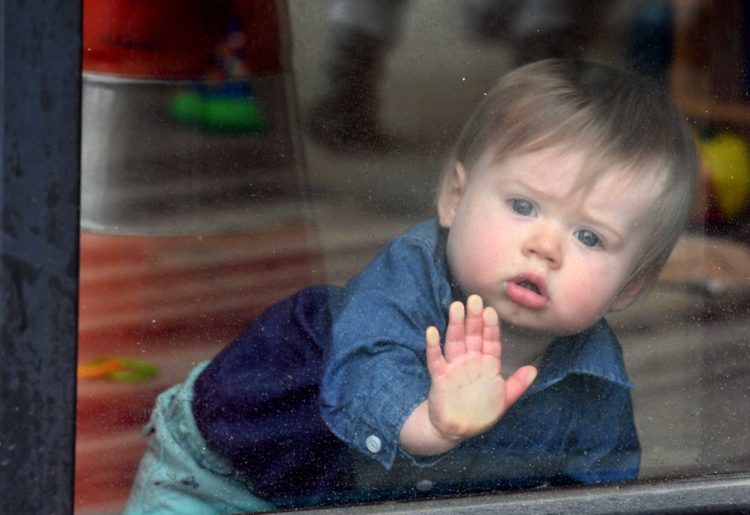-
 June 6, 2020
June 6, 2020ALBANY — As businesses slowly reopen and state employees make plans for returning to offices, for many Capital Region families access to child care will be crucial to coming back to work
While child care services remained an essential business throughout the stay-at-home orders aimed at preventing the spread of the coronavirus, the pandemic has pushed many providers to the financial brink as classroom capacity has been reduced and parents opted to keep their children home.
Roughly 28% of child care providers who serve infants and toddlers outside New York City have closed, including 22% of family child care providers and 50% of child care centers, based on data that was self-reported to the state Office of Children and Family Services as of May 21, according to Raising NY, a coalition of advocacy organizations focused on expanding access to early childhood services.
Providers that have remained open are reporting reduced enrollment, with family child care providers reporting about a 28% utilization and child care centers averaging 15%.
Those numbers are even more stark for the Capital Region, where 43% of child care centers in Albany County are closed, 38% in Schenectady County, 38% in Rensselaer County and 29% in Saratoga County, according to Brightside Up.
Brightside Up, which helps families in the Capital Region access child care, has seen a “slight uptick” in people seeking referrals for service providers but overall child care centers are operating at a reduced capacity, the organization’s Executive Director Abbe Kovacik said.
“Currently, we’re operating at about 40% of the child care that we have had before the pandemic. People are operating at reduced capacity,” Kovacik said. “If we do smaller group sizes the program will run at a deficit because they don’t have enough resources coming in to pay the salary they need to meet the ratio.”
The region already faced a shortage in child care resources prior to the coronavirus, according to an earlier survey, which showed about 58% of providers in the Capital Region have waiting lists compared to 48% of providers statewide.
Child care centers operating at a reduced capacity has forced some providers into slimmer margins in order to comply with child-to-teacher ratios. Kovacik said for a classroom of four children, one teacher will suffice, but adding one more child would push a center into needing two teachers.
“Having a full classroom helps you to afford the teacher’s salary,” Kovacik said. “If a fifth child comes, you need another adult, but one more child isn’t enough to pay the whole salary.”
Children and Family Services has been working with child care providers on issues facing the industry while also providing guidance for those who have remained open during mass closings of businesses and offices to slow the spread of COVID-19 cases.
Those providers who have chosen to stay open have modified floor layouts and implemented specific protocols to protect employees and the children, minding all state and Centers for Disease Control and Prevention guidance, Kovacik said.
Gov. Andrew M. Cuomo recently announced that summer day camps could reopen on June 29, which could help alleviate the burden of reduced capacity at daycares, but the approval may have come too late.
Kovacik and local elected officials say many organizations as well as municipalities that offer day camps have already been canceled.
“A lot of our towns have already pulled the plug,” Rensselaer County Executive Steve McLaughlin said regarding day camps in the county.
Kovacik expressed the same concern, which she said will only put more demand on existing child care options.
“I would not be surprised if employers had vast employees who could not come back to work because they don’t have child care,” she said.
The Capital District YMCA, which has been providing child care at a reduced capacity throughout the stay-at-home order, will host “child summer care” in lieu of the camps that the nonprofit typically offers, said Erin Breslin, spokeswoman for the organization.
“We’re not calling it camp because there are so many elements of camp. We’re not going to have bussing, we’re not sending kids on field trips,” Breslin said. “We don’t feel we can safely provide that given lack of any protocol to do it.”
Victory Riedy, owner of Victory Childcare, Inc., in Albany, has been able to weather the storm through the pandemic, remaining open for child care services to essential workers.
However, Riedy said it hasn’t been easy with fewer kids coming for child care, and is very fortunate for the help she has received. The center, located in the Leo W. O’Brien Federal Building on Clinton Avenue, received federal funding through the CARES Act to help maintain staff salaries, and other organizations and community members have helped with donations of personal protective equipment and financial assistance, she said.
“I’m so thankful for our families. We have to be able to maintain our staff if we want them here when families come back to work and need our care,” Riedy said. “I understand a lot of centers are closing, they just can’t make it. I know that our industry is really being impacted by all this.”
So far, financial assistance has been made available to providers for obtaining face masks, gloves and other protective gear, paying the salaries of employees as well as funding to help essential workers pay for child care. About $30 million from New York’s federal CARES Act funding went to funding child care scholarships for essential workers. Child care providers expect further assistance for the sector in the future.
Raising NY is calling for the state to invest some of the $134 million still available in federal funding to invest in the child care system.
- Categories:
- News
Leave a comment
Comments(0)